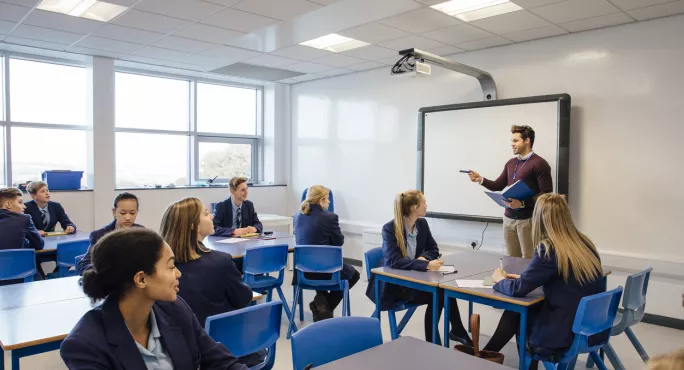UK pupils lost third of learning time during pandemic

Pupils across the UK have lost out on a third of their learning time amid Covid-19 - even when home lessons are taken into account, a study suggests.
Researchers from the London School of Economics and Political Science (LSE) and the University of Exeter found that the poorest pupils suffered larger learning losses than their richer peers amid the pandemic.
Considering learning undertaken at home and in the classroom, the analysis suggests that pupils in England, on average, lost 61 days of schooling between March 2020 and April 2021. The usual school year is 190 days.
News: Primary teachers face 3 months of Covid learning loss
Analysis: Will schools take the hit for Sir Kevan’s departure?
News: Catch-up effort ‘a bit feeble’, says Sir Kevan Collins
Larger average losses occurred in Scotland (64 days) and Wales (66 days), while pupils in Northern Ireland also lost 61 days.
The report suggests that the poorest pupils in England lost 34.9 per cent of their learning during the second round of school closures in 2021 - less than the most affluent pupils in the rest of the UK, who lost 38.6 per cent of learning time.
Researchers calculated the education loss by assessing school opening and closure dates, official school attendance figures, and data on daily learning rates (combining home and classroom learning) reported by parents.
Lee Elliot Major, professor of social mobility at the University of Exeter and report co-author, said: “Our analysis reveals that pupils’ learning loss varies between the four home nations, partly due to historical differences in school term times and partly as a result of school closure policies.
“This shows that ministers can make a difference - but quick action is needed.”
LSE professor Stephen Machin, director of the Centre for Economic Performance (CEP) and co-author of the report, said: “Even a few days’ extra learning loss can have a large impact on educational achievement and life outcomes, and these are big losses of around 60-65 days.
“Learning losses suffered during the pandemic are manifested in stark gaps in attainment between children from poorer backgrounds and their more privileged counterparts, which is likely to cause a significant decline in social mobility for younger generations.”
The findings come after the latest government figures show that more than 640,000 pupils in England were not in school owing to Covid-19 last week - up from around 384,000 the week before.
Current rules state that children have to self-isolate for 10 days if another pupil in their bubble - which can be an entire year group at secondary school - tests positive for coronavirus.
But updated Department for Education (DfE) guidance says keeping children in consistent bubbles will not be needed for summer provision or in the autumn.
The report, from the CEP, found that just over half (53 per cent) of 10,000 adults surveyed support extending the school day to make up for learning losses.
More than two in three (68 per cent) respondents in England support allowing greater flexibility for pupils to repeat a whole school year so they can catch up.
Andrew Eyles, CEP research economist, said: “Rapidly rising absences in schools in June 2021 once again prompt discussion about potential policies that could address the learning loss suffered during the pandemic.
“Our survey responses show there is significant public support for two major policies - extending the school day and allowing pupils to repeat a whole school year.”
A government spokesperson said: “We have committed to an ambitious and long-term education recovery plan, including an investment, to date, of more than £3 billion and a significant expansion of our tutoring programme, to support children and young people to make up for learning lost during the pandemic.”
You need a Tes subscription to read this article
Subscribe now to read this article and get other subscriber-only content:
- Unlimited access to all Tes magazine content
- Exclusive subscriber-only stories
- Award-winning email newsletters
Already a subscriber? Log in
You need a subscription to read this article
Subscribe now to read this article and get other subscriber-only content, including:
- Unlimited access to all Tes magazine content
- Exclusive subscriber-only stories
- Award-winning email newsletters
topics in this article



